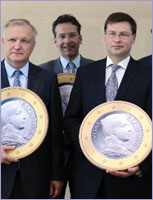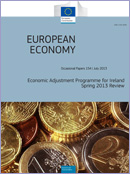|
|
|
|
|
|
 |
 |
 |
 |
Green light for Latvia to adopt the euro on 1 January 2014
Following the formal approval on 9 July by the ECOFIN Council of EU finance ministers on the go-ahead for Latvia to adopt the euro as of 1 January 2014, festivities were held at the European Commission’s Charlemagne building. Olli Rehn, Vice-President of the European Commission participated in the festivities, and was joined by Valdis Dombrovskis, Latvia’s Prime Minister, Andris Vilks, Latvia's Finance Minister, Ilmars Rimšēvičs, Governor of the Central Bank of Latvia, Eurogroup President Jeroen Dijsselbloem, and ECOFIN Council President Rimantas Šadžius. The decision to accept Latvia’s application to join the euro area was made possible due to the country’s high degree of sustainable convergence with the euro area. EU finance ministers officially approved the application, based on the positive assessment by the Commission and the ECB and strong evidence that Latvia has met all convergence criteria and that its economic policy is on a sustainable path. The Council also set the conversion rate at 0.702804 Latvian lats to one euro, which corresponds to its current central rate in the EU's exchange rate mechanism ERM II.
|
 |
 |
 |
|
 |
 |
 |
 |
 |
|
 |
 |
 |
| ...all three Baltic States are now either inside, or well on their way to, the economic and political core of Europe. This is a tribute not only to the determined policy action that all three took in the wake of the financial crisis, but also to their remarkable economic and democratic transition since regaining independence in that dramatic summer of 1991. |
 |
Olli Rehn, Vice-President of the European Commission
|
|
|
|
 |
 |
 |
 |
Banking Union: Commission proposes Single Resolution Mechanism for banks facing serious difficulties
The Commission has proposed a Single Resolution Mechanism (SRM) for the banking union. The mechanism, announced on 10 July, would ensure that a bank facing serious difficulties could be resolved efficiently and with minimal cost to taxpayers and the real economy. The SRM would complement the Single Supervisory Mechanism (SSM), which, once operational in 2014, will see the European Central Bank (ECB) take ultimate responsibility for the supervision of banks in the euro area and in other EU Member States that decide to join the banking union. The SRM would cover the approximately 6,000 banks that are subject to the SSM, and would apply the rules on bank recovery and resolution that were agreed upon by EU finance ministers last week. The SRM is open to all Member States willing to join the banking union and would come into force in 2015. Implementation of the full banking union will build stability in euro area financial system, restore confidence in its banks and overcome fragmentation in markets - the SRM is a crucial part of this.
|
 |
|
 |
 |
|
 |
 |
 |
 |
Commission to support public investment by allowing temporary conditional deviations from structural deficit paths
The European Commission will support public investment for sustainable growth in Member States by allowing – on a case-by-case basis – temporary deviations from the structural deficit path set in country specific recommendations. The measure is to designed to encourage spending on productive investments which otherwise might be reduced in the context of fiscal consolidation. It will be applied under the preventive arm of the Stability and Growth Pact (SGP), and fully adhere to the provisions of the SGP. The idea was first proposed in the Communication on a “Blueprint for a deep and genuine economic union” and was transformed into a legal requirement in the Two-Pack legislation. The measure was officially announced in a letter sent by Commission Vice President Olli Rehn to EU finance ministers on 3 July. It will be first implemented when assessing the national budgets for 2014 and the budgetary outcomes for 2013.
|
 |
|
 |
 |
|
|
 |
 |
 |
 |
EU Finance ministers adopt country specific recommendations, formally concluding the European Semester
On 9 July, EU finance ministers adopted the final version of country-specific recommendations on Member State’s economic and employment policies under the European Semester. Adoption by the ECOFIN Council follows endorsement by the European Council and represents the last formal step in concluding the 2013 European Semester. The Council also endorsed two documents relating to the “Two-Pack” of economic governance regulations. The documents establish harmonised frameworks for the draft budgetary plans and debt issuance reports that are to be submitted by all Member States, as well as for regular reporting by Member States on budgetary execution and actions taken to correct their deficits under the Excessive Deficit Procedure. The frameworks will ensure the cross-country consistency and comparability of fiscal surveillance assessments conducted by the Commission.
|
 |
|
 |
 |
|
 |
 |
 |
 |
Commission launches Expert Group on debt redemption fund and eurobills
The European Commission has launched an Expert Group on a debt redemption fund and eurobills. Commission President Barroso announced the launch, which is part of the overall agreement on the Two-Pack, during a debate in the European Parliament on 2 July. The Expert Group will study the merits and risks, legal requirements and financial consequences of partially substituting the national issuance of debt with joint issuance in the form of a redemption fund and eurobills. The group is composed of experts in law and economics, public finance, financial markets and sovereign debt management, and is chaired by Gertrude Tumpel-Gugerell, a former member of the executive board of the European Central Bank (ECB). The group will present its final report to the Commission by March 2014.
|
 |
|
 |
 |
|
 |
 |
 |
 |
Barroso praises accomplishments of EU Irish Presidency, welcomes ambitious objectives of the Lithuanian Presidency
Reviewing the Irish Presidency of the EU, Commission President Barroso enumerated a long list of accomplishments. In remarks to the European Parliament on 2 July, Barroso noted the political agreements regarding two cornerstones of Banking Union: the Single Supervisory Mechanism and the Capital Requirements Directive and Regulation, as well as a general approach on Bank Resolution and Recovery, on Markets in Financial Instruments and on Packaged Retail Investment Products. Barroso also thanked the Irish Presidency for supporting the successful consolidation of the European Semester, the adoption of a European Youth Guarantee, and most of all, the political deal reached on the Multiannual Financial framework. Looking ahead, Barroso said that the Commission counts on the Lithuanian Presidency, which begins in July, to help oversee the national part of the 2013 European Semester – including the first implementation of the two-pack – and move forward work on deepening the Economic and Monetary Union (EMU). The Commission will also come with legal proposals on ex-ante policy coordination and on the Competitiveness and Convergence Instrument. On 5 July, a Commission delegation visited Lithuania's capital Vilnius for a series of meetings to launch the incoming Presidency.
|
 |
|
 |
 |
|
 |
 |
 |
 |
European Alliance for Apprenticeships to fight youth unemployment
The European Commission launched the European Alliance for Apprenticeships on 2 July at the 2013 WorldSkills competition in Leipzig, Germany. The Alliance will help to fight youth unemployment by improving the quality and supply of apprenticeships across the EU through a broad partnership of key employment and education stakeholders. It also seeks to change attitudes towards apprenticeships. It will in particular identify the most successful apprenticeship schemes in the EU and apply appropriate solutions in each Member State. In remarks at the round table for the Promotion of Youth Employment in Europe, hosted by Chancellor Merkel in Berlin on 3 July, Commission President Barroso said: “The future of the young is the future of Europe. We cannot fail them.” Young people are bearing the brunt of the crisis: according to the latest figures from Eurostat, 5,525 million young persons (under 25) were unemployed in the EU in May 2013, representing an EU youth unemployment rate of 23.1%.
|
 |
|
 |
 |
|
 |
 |
 |
 |
Vice-President Rehn stars in premiere of Euronews programme “Real Economy”
Tuesday, 2 July, saw the premiere of “Real Economy” on Euronews. The first episode on “Growth” featured Vice-President Rehn, as well as an explanation of the EU’s Europe 2020 growth strategy and two field stories from Sweden and Portugal. The TV channel’s new magazine is designed to bring the complexities of economic matters in the EU closer to its daily audience of 6.5 million viewers. Each 12-minute episode deals with topical economic issues such as competitiveness, structural reforms, monetary policy or unemployment in a way “that my grandmother can understand” according to “Real Economy” anchor Maithreyi Seetharanam. Every two weeks a new episode premieres at 10.45 am CET, and is repeated 12 times throughout the weekly schedule.
Besides watching directly on TV, “Real Economy” can also be followed online – live or on demand, with the next episodes scheduled for 16 (youth unemployment) and 30 July (Greece). ECFIN co-funds the programme together with other Commission services.
|
 |
|
 |
 |
|
 |
 |
 |
 |
Croatia’s accession to the EU: another milestone in the construction of a united Europe
On 1 July, Croatia became the 28th Member State of the European Union, thus marking another milestone in the construction of a united Europe. Before the global economic crisis, the Croatian economy achieved rapid growth and was catching up with the EU. However, Croatia suffered from the onset of the global economic and financial crisis in 2008. The country entered into a long recession. As with many EU Member States, Croatia faces considerable challenges in improving the competitiveness of its economy and kick-starting job-rich growth while ensuring further fiscal consolidation down the road. According to the Commission's 2013 spring forecast, the economy is expected to contract by 1% in 2013. However, the improved international environment, EU accession and new legislation adopted to reinforce the investment climate should underpin a moderate recovery in 2014.
|
 |
|
 |
 |
|
|
|
 |
 |
 |
 |
Ireland 10th review report. European Economy. Occasional Papers 154
This report describes the official findings of the Tenth Review Mission to Ireland. Staff teams from the European Commission (EC), European Central Bank (ECB), and International Monetary Fund (IMF) visited Dublin during 23 April-2 May for the tenth review of the government’s economic programme. The report concludes that Ireland’s programme remains on track, the gradual recovery is continuing and that there have been further improvements in market conditions for the sovereign and for Irish banks. The authorities have made significant progress on financial sector repair and restoring sustainability to public finances. Economic growth is forecast at about 1% in 2013 and just over 2% in 2014. Conclusion of the review has made available a disbursement of EUR 1 billion by the IMF and EUR 1 billion by the European Financial Stability Facility (EFSF), with EU Member States disbursing a further EUR 0.5 billion through bilateral loans.
|
|
 |
|
|
|
|
|
|
|
|
|
|
|
|
|
|
|
 |
| Directorate-General for Economic and Financial Affairs |
 |
|